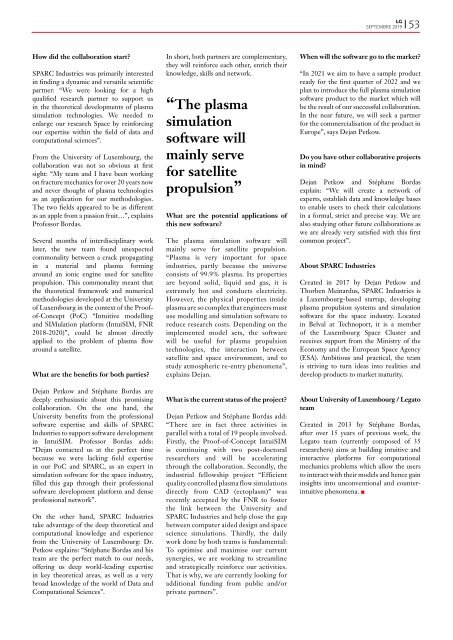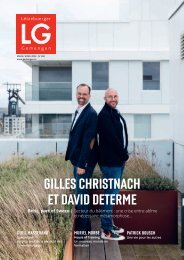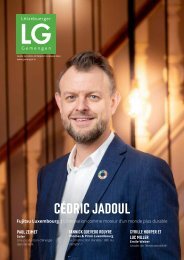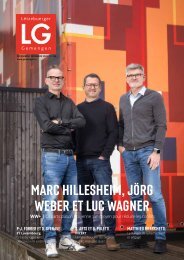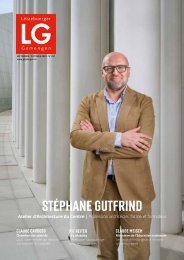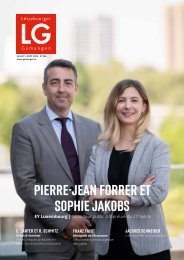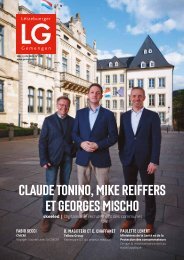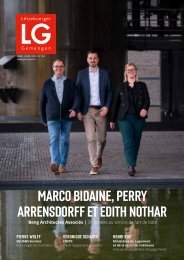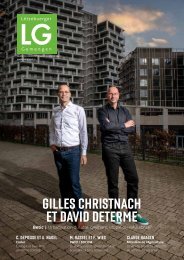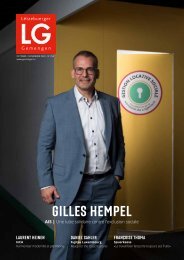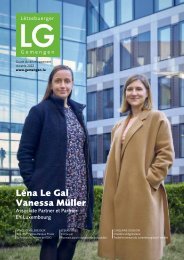LG 226
You also want an ePaper? Increase the reach of your titles
YUMPU automatically turns print PDFs into web optimized ePapers that Google loves.
<strong>LG</strong><br />
SEPTEMBRE 2019<br />
53<br />
How did the collaboration start?<br />
SPARC Industries was primarily interested<br />
in finding a dynamic and versatile scientific<br />
partner: “We were looking for a high<br />
qualified research partner to support us<br />
in the theoretical developments of plasma<br />
simulation technologies. We needed to<br />
enlarge our research Space by reinforcing<br />
our expertise within the field of data and<br />
computational sciences”.<br />
From the University of Luxembourg, the<br />
collaboration was not so obvious at first<br />
sight: “My team and I have been working<br />
on fracture mechanics for over 20 years now<br />
and never thought of plasma technologies<br />
as an application for our methodologies.<br />
The two fields appeared to be as different<br />
as an apple from a passion fruit…”, explains<br />
Professor Bordas.<br />
Several months of interdisciplinary work<br />
later, the new team found unexpected<br />
commonality between a crack propagating<br />
in a material and plasma forming<br />
around an ionic engine used for satellite<br />
propulsion. This commonality meant that<br />
the theoretical framework and numerical<br />
methodologies developed at the University<br />
of Luxembourg in the context of the Proofof-Concept<br />
(PoC) “Intuitive modelling<br />
and SIMulation platform (IntuiSIM, FNR<br />
2018-2020)”, could be almost directly<br />
applied to the problem of plasma flow<br />
around a satellite.<br />
What are the benefits for both parties?<br />
Dejan Petkow and Stéphane Bordas are<br />
deeply enthusiastic about this promising<br />
collaboration. On the one hand, the<br />
University benefits from the professional<br />
software expertise and skills of SPARC<br />
Industries to support software development<br />
in IntuiSIM. Professor Bordas adds:<br />
“Dejan contacted us at the perfect time<br />
because we were lacking field expertise<br />
in our PoC and SPARC, as an expert in<br />
simulation software for the space industry,<br />
filled this gap through their professional<br />
software development platform and dense<br />
professional network”.<br />
On the other hand, SPARC Industries<br />
take advantage of the deep theoretical and<br />
computational knowledge and experience<br />
from the University of Luxembourg: Dr.<br />
Petkow explains: “Stéphane Bordas and his<br />
team are the perfect match to our needs,<br />
offering us deep world-leading expertise<br />
in key theoretical areas, as well as a very<br />
broad knowledge of the world of Data and<br />
Computational Sciences”.<br />
In short, both partners are complementary,<br />
they will reinforce each other, enrich their<br />
knowledge, skills and network.<br />
“The plasma<br />
simulation<br />
software will<br />
mainly serve<br />
for satellite<br />
propulsion”<br />
What are the potential applications of<br />
this new software?<br />
The plasma simulation software will<br />
mainly serve for satellite propulsion.<br />
“Plasma is very important for space<br />
industries, partly because the universe<br />
consists of 99.9% plasma. Its properties<br />
are beyond solid, liquid and gas, it is<br />
extremely hot and conducts electricity.<br />
However, the physical properties inside<br />
plasma are so complex that engineers must<br />
use modelling and simulation software to<br />
reduce research costs. Depending on the<br />
implemented model sets, the software<br />
will be useful for plasma propulsion<br />
technologies, the interaction between<br />
satellite and space environment, and to<br />
study atmospheric re-entry phenomena”,<br />
explains Dejan.<br />
What is the current status of the project?<br />
Dejan Petkow and Stéphane Bordas add:<br />
“There are in fact three activities in<br />
parallel with a total of 19 people involved.<br />
Firstly, the Proof-of-Concept IntuiSIM<br />
is continuing with two post-doctoral<br />
researchers and will be accelerating<br />
through the collaboration. Secondly, the<br />
industrial fellowship project “Efficient<br />
quality controlled plasma flow simulations<br />
directly from CAD (ectoplasm)” was<br />
recently accepted by the FNR to foster<br />
the link between the University and<br />
SPARC Industries and help close the gap<br />
between computer aided design and space<br />
science simulations. Thirdly, the daily<br />
work done by both teams is fundamental:<br />
To optimise and maximise our current<br />
synergies, we are working to streamline<br />
and strategically reinforce our activities.<br />
That is why, we are currently looking for<br />
additional funding from public and/or<br />
private partners”.<br />
When will the software go to the market?<br />
“In 2021 we aim to have a sample product<br />
ready for the first quarter of 2022 and we<br />
plan to introduce the full plasma simulation<br />
software product to the market which will<br />
be the result of our successful collaboration.<br />
In the near future, we will seek a partner<br />
for the commercialisation of the product in<br />
Europe”, says Dejan Petkow.<br />
Do you have other collaborative projects<br />
in mind?<br />
Dejan Petkow and Stéphane Bordas<br />
explain: “We will create a network of<br />
experts, establish data and knowledge bases<br />
to enable users to check their calculations<br />
in a formal, strict and precise way. We are<br />
also studying other future collaborations as<br />
we are already very satisfied with this first<br />
common project”.<br />
About SPARC Industries<br />
Created in 2017 by Dejan Petkow and<br />
Thorben Meinardus, SPARC Industries is<br />
a Luxembourg-based startup, developing<br />
plasma propulsion systems and simulation<br />
software for the space industry. Located<br />
in Belval at Technoport, it is a member<br />
of the Luxembourg Space Cluster and<br />
receives support from the Ministry of the<br />
Economy and the European Space Agency<br />
(ESA). Ambitious and practical, the team<br />
is striving to turn ideas into realities and<br />
develop products to market maturity.<br />
About University of Luxembourg / Legato<br />
team<br />
Created in 2013 by Stéphane Bordas,<br />
after over 15 years of previous work, the<br />
Legato team (currently composed of 35<br />
researchers) aims at building intuitive and<br />
interactive platforms for computational<br />
mechanics problems which allow the users<br />
to interact with their models and hence gain<br />
insights into unconventional and counterintuitive<br />
phenomena. n


